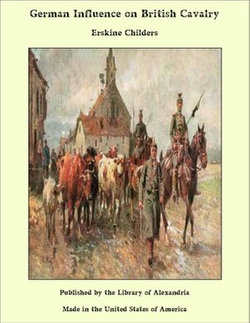Two works by General von Bernhardi have been translated into English, and widely circulated among our military men. I propose to say but little about the first, "Cavalry in Future Wars," because I have already endeavoured to criticize it in detail in my own book, "War and the Arme Blanche." It is the second work, "Cavalry in War and Peace," published only in 1910, that I wish to make the basis of discussion in this volume; but in order to explain the history of German influence on British Cavalry, it is necessary to recall briefly certain features of its predecessor. "Cavalry in Future Wars" was first published in German in 1899, before the Boer War broke out. There was a second edition in 1902, when the Boer War was drawing to a close, and this second edition, headed by General French's Introduction, was translated and published in England in 1906. It was a strange work, strangely sponsored. The keynote was fire-action for Cavalry, the moral drawn by the English sponsor shock-action for Cavalry. The chapters on fire-action, urging the adoption of a firearm even better than the Infantry rifle in substitution for a mere pop-gun, formed in themselves a complete refutation of shock; while the chapters on shock, so illogical and self-contradictory was the method of exposition, formed an equally complete refutation of fire-action. It is true that the spirit of fire predominated, that fire was the General's message to his lethargic brother-officers, but the message was so strangely expounded that it is no wonder that for ten years they turned a deaf ear to it. Instead of telling them at the outset that if they themselves adopted a good firearm, and learnt to use it properly, they would immensely enhance the value of Cavalry for all the purposes of war, he opened his argument with a melancholy dirge over the departed glories of the Cavalry owing to the adoption by other classes of troops of the deadly modern firearm. They must recognize, he told them, that they had been "driven out of their place of honour on the battlefields of the plains"; that they could henceforward only attack Infantry who were already so shattered and demoralized by the fire of other Infantry as to have reached the point of throwing away their arms, and much more in the same sense. Never was such a tactless prophet! And the pity of it was that he did not really mean all he said. What he meant was that the ancient glories of the arme blanche, when pitted against the firearm, were gone past recall—a circumstance scarcely worth an elegy, one would imagine, from a scientific soldier. War is business, not romance, and if the same or better results can be produced by an intelligent and dashing use of the firearm, it is waste of breath to lament the decay of the lance and sword. It was the main purpose of the General's work to prove that these results could be so obtained, and whenever he warmed to his subject, and fell into temporary oblivion of the romantic weapons, he proved his point well enough, in theory.



Share This eBook: